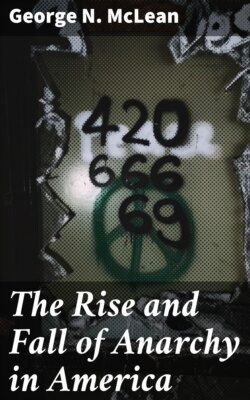Читать книгу The Rise and Fall of Anarchy in America - George N. McLean - Страница 6
На сайте Литреса книга снята с продажи.
REVENGE.
ОглавлениеTable of Contents
“Revenge, working men! to arms! Your masters sent out their bloodhounds—the police. They killed six of your brothers at McCormick’s this afternoon. They killed the poor wretches, because they, like you, had the courage to disobey the supreme will of your bosses. They killed them because they dared ask for the shortening of the hours of toil. They killed them to show you, ‘free American citizens,’ that you must be satisfied and contented with whatever your bosses condescend to allow you, or you’ll get killed. You have for years endured the most abject humiliation; you have for years suffered immeasurable iniquities; you have worked yourselves to death; you have endured the pangs of want and hunger; your children you have sacrificed to the factory lords—in short, you have been miserable, obedient slaves all these years. Why? To satisfy the insatiable greed to fill the coffers of your lazy, thieving master. When you ask them now to lessen your burden he sends his blood-hounds out to shoot you, kill you. If you are men, if you are the sons of your grandsires who have shed their blood to free you, then you will rise in your might, Hercules, and destroy the hideous monster that seeks to destroy you. To arms we call you! To arms!
Your Brothers.”
The German portion difiereddiffered from the above mainly in the following passage: “Why? Because you dared ask for the shortening of the hours of labor.” In the German copy it ran: “Because you dared ask for all that you believed to be your rights.” Instead of being addressed, as in the English, to American citizens, it was directed to the followers of anarchy and socialism.
Another circular was distributed calling a meeting at the Haymarket for the night of May 4, and urging working-menworking men to arm and go in full force. In the Arbeiter Zeitung appeared the letter “Y,” meaning Ypsilon, which was the signal for the armed anarchists to turn out, and in the department of the paper known as the “Letter-Box” the word “Ruhe,” signifying that the time for revolution was at hand.
There were about three hundred and fifty anarchists carrying concealed weapons at the HaymarkstHaymarket massacre on the 4th of May, 1886, and probably about fifteen hundred present in all at the time of the explosion. A. R. Parsons had delivered his speech and Samuel Fielden was portraying to the sympathizing crowd, with all the eloquence he could command, the wide and yawning unbridged gulf between capital and labor, when seven companies of police, numbering nearly two hundred men, under command of their superior officers, swooped down upon the lawless mob. Captain Ward, in clear and ringing tones, commanded these land pirates to quietly disperse, when from an alley contiguous was seen in the darkness a little line of fire passing directly over the heads of the motlymotley crowd. The hissing fiend, hurled by some practiced hand to perform its hellish mission, fell directly between two of the ranks of our brave and noble officers, and exploded with a detonation which seemed to shake the city from center to circumference, dealing death to several brave and noble officers, while the wounded and dying numbered over sixty, who a moment before were in the best of spirits and in the discharge of their duty as protectors of public peace, were stricken down without a moment’s warning. But was there a man dismayed, although the groans of the wounded and mangled victims could be heard in every direction, not knowing but the next instant another explosion would strew the ground with fresh victims from their ranks? Scarcely had the sound of the explosion died away in the echoing distance, or the smoke from the fatal bomb rose up to be lost in the dark and murky clouds, ere the spirit of patriotism rose up in their hearts, inspiring them to deeds of noble daring, when they boldly charged in a solid column this band of treacherous outlaws. Captain Bonfield seized a revolver from the hand of a fallen officer, at the same time drawing his own revolver, and from both hands he rained a shower of lead into the ranks of the enemy. Under this aggressive movement the anarchists began beating a hasty retreat.
The wounded officers were removed to the County Hospital, while a large detachment were kept busy during the night caring for the dead and dying. The exact number of killed and wounded among the anarchists could not be ascertained, as they were removed from the ensanguined field immediately by their friends to places of safety, and medical assistance secured for them from among the socialistic fraternity.
On the 5th of May, Rudolph Schnaubelt was arrested on suspicion that he was an important factor in the conspiracy. On an investigation which followed, he very adroitly managed to impress the authorities of his innocence, when he was discharged, and he at once disappeared from the city; but during the progress of the trial, evidence was obtained which proves almost conclusively that Rudolph Schnaubelt was the arch fiend who hurled the deadly bomb causing so many brave officers to bite the dust without a moment’s warning.
